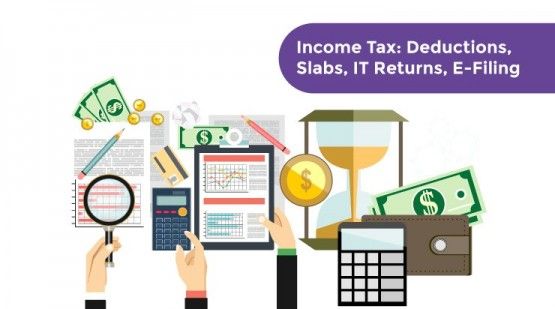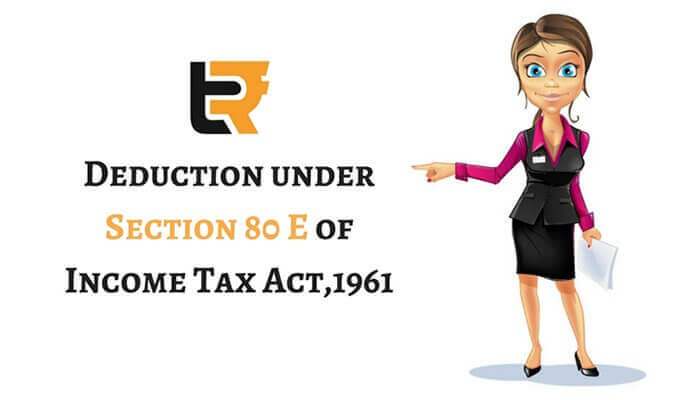Get all information about income tax slabs, deductions, and exemptions for the Financial Year 2020-21.
ABSTRACT
As a prudent Assessee, one must know the latest Income tax slabs to make the basic calculation and income tax return filing online. Also, a fair knowledge about Chapter VI A deductions for making a sound investment portfolio is required. One must know about avenues of income and transactions that are exempted from the purview of Income Tax to make utilization of such opportunities.
Income tax is dynamic in nature provisions regarding basic exemption, tax slabs, and tax rates are revised from time to time by finance act. Our union Finance Minister Nirmala Sitaraman in the budget for 2020-21 introduced a new option for individuals and HUF for paying taxes at a lower rate without availing deductions such as house rent allowance (HRA) investments, LIC premium, NSC, medical, etc.
TAX SLAB FOR INDIVIDUALS AND HUF
| Income tax slab | New tax regime | Old tax regime |
| 0 to 2,50,000 (Basic Exemption) | Nil | Nil |
| 2,50,001 - 5,00,000 | 5% | 5% |
| 5,00,001 -7,50,000 | 12500 + 10% of total income exceeding 5,00,000 | 12500 + 20% of total income exceeding 5,00,000 |
| 7,50,001- 10,00,000 | 37500 + 15% of total income exceeding 7,50,000 | 62500 + 20% of total income exceeding 7,50,000 |
| 12,50,001- 15,00,000 | 125000 + 25% of total income exceeding 12,50,000 | 187500 + 30% of total income exceeding 12,50,000 |
| Above 15,00,000 | 187500 + 30% of total income exceeding 15,00,000 | 262500 + 30% of total income exceeding 15,00,000 |
It is an option for the taxpayer to choose between the old income tax rate and slabs or the new ones. Every person has to make his/her calculation as per old and new tax regime and calculate which one is beneficial based on the type of investments made and choose to pay likewise. The new tax regime gives the option to the Assessee either to pay taxes at a higher rate along with taking deduction benefit or to pay taxes at lower without any benefit of deductions. Basic exemption for that resident senior citizen (aged 60 to 80 years) can avail is 3, 00,000/- and resident super senior citizens (aged above 80 years) is 5, 00,000/- Rebate under section 87(A) - 100% tax rebate subject to a maximum of 12,500 available to a resident individual whose total income does not exceed 5 Lakhs after reducing Chapter VIA deductions.
Cess is a tax on tax. Various nature cesses such as Higher education cess, Secondary education cess, Krishi Kalyan cess, etc altogether amounting to 4%.
Surcharge at 10% for income above 50 Lakhs and at 15% for income above 1 Cr.
INCOME TAX SLABS FOR FIRMS AND DOMESTIC COMPANIES
| Tax Head | Firms | Domestic Companies |
| Income Tax for turnover up to 400 Cr | 30% | 25% |
| Income Tax for turnover above 400 Cr | 30% | 30% |
| A surcharge as % of income tax | 12% of tax in case the total income exceeds 1 Cr | 7% of tax in case income is more than 1 Cr but less than 10 Cr. 10% of tax in case income is more than 10 Cr. |
| Cess as % of tax and surcharge | 3% of tax plus surcharge | 3% of tax plus surcharge |
INCOME TAX DEDUCTIONS:
Chapter VI A deductions are investments that provide financial security, these transactions promoted by giving Assessee temptation in the form of tax deductions.
A specific amount is reduced from an individual’s total tax liability, it is called an income tax deduction. All the various tax deductions are conditional. The Assessee has to comply with that predetermined criteria to avail of these Income tax deductions. Some of the major tax deductions are as follows-
Section 80C is the most widely used option for income tax tools. Only an individual or a HUF is eligible to avail of this deduction.
Investment u/s 80C isn’t allowed as a deduction from income under the head capital gains. It means that if the income of an individual comprises capital gains alone, then Section 80C deductions cannot be used for saving tax.
Collectively investments under Section 80C, 80CCC, and 80CCD (1) can avail benefits up to a maximum of Rs 1.5 lakh. The most commonly used investments are Life insurance premium, National Pension Scheme, Principal component of the housing loan repayment, ELSS, Contribution to PPF Account, NSC, Post office time deposits, etc.
SECTION 80D MEDICAL INSURANCE
This is in general most commonly used investment that safeguards the policyholder and his/her dependents from huge medical bills. The cover varies from policy to policy. One could save tax on medical insurance premiums paid for the health of oneself, immediate family, and dependent parents. The limit under this section is Rs 25,000 for premiums paid for self/family. For premiums paid for senior citizen parents, one can claim deductions of up to Rs 50,000. Additionally, health check-ups to the extent of Rs 5,000 are also allowed and covered within the overall limit. Employers paying such premiums are also eligible for deduction under this section.
SECTION 80E DEDUCTION FOR EDUCATIONAL LOAN FOR HIGHER STUDIES
The necessary conditions attached to availing such deduction are that the loan should have been taken from a bank or a FI for pursuing higher studies (in India or abroad) by the individual himself or her spouse or children. One may begin availing this deduction beginning from the year in which the loan starts getting repaid and up to the next 7 years or before repayment of the loan, whichever is earlier.
SECTION 80G DEDUCTION FOR DONATIONS
Charitable organizations need to be registered for availing benefits under this section. This deduction is based on the receiving organization, claim for deduction may vary from 50% to 100% of the amount donated.
SECTION 80TTA DEDUCTION ON SAVINGS ACCOUNT INTEREST
Section 80TTA offers a deduction of up to Rs. 10,000 earned as income from savings account interest. This exemption is available only for Individuals and HUFs. In case the income arising out of bank interest is less than Rs.10, 000 the whole amount will be allowed as a deduction. However, in cases where income arising out of Bank interest exceeds Rs.
10,000, the exceeding amount would be taxable.
Section 80EE allows homeowners to claim an additional deduction of up to Rs.50 Thousand (Section 24) for the interest component of the home loan EMI. It is subject to the condition that the loan must not be for more than Rs 35 Lakhs and the value of the property must not be more than Rs 50 lakhs. An additional condition annexed to this section is, that the individual must not have any other property registered under his name at the time the loan is sanctioned.
SECTION 80U
Usually, people from physical disabilities have to go through a lot of hardship. With this deduction, Income tax is encouraging people to take care of such people and spending on them is liable to a deduction. For physical disability, which includes blindness or mental retardation, one can claim a deduction up to Rs. 75,000. For various other disabilities, the deduction limit available up to Rs. 1.25 lakhs.
SECTION 80G
The Income-tax Act promotes giving back to society through social causes. The donations specified under this section are deductible up to 100% or 50%. Cash deductions of over Rs. 2,000 will not be eligible for deductions.
SECTION 80GGB
The deduction can be availed by an Indian company for contributions made via any mode other than cash to a political party registered under section 29A of the REPA or an electoral trust. Companies can claim 100% of their contributions as deductions.
CONCLUSION
These various deductions and exemptions can be used tools for tax management of the Assess and save final tax liability via a legitimate route. The Income-tax Act gives deductions. They wish to promote and disallow as expense or deduction when it wishes to discourage. Like when the act wants to discourage cash transactions. Under section 80G transactions exceeding Rs. 2000 are not allowed as deduction.
Hope the article is informative, we at PGA try giving the expert income and Best GST consultant to our clients. For more services such as accounting services online, GST returns, Audits, etc. do contact us.



